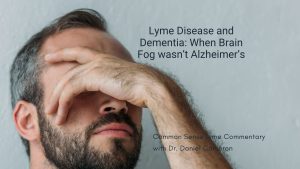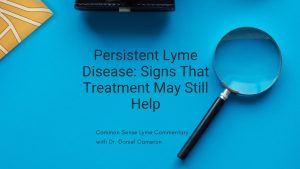Call for your appointment today 914-666-4665 | Mt. Kisco, New York

In the United States, as many as 15.4% of the blacklegged ticks were found to be infected with B. miyamotoi, compared with up to 4% in Europe and Japan, according to Koetsveld from the Center for Experimental and Molecular Medicine, Academic Medical Center, Amsterdam, the Netherlands. [1]
Meanwhile, “Seroprevalence studies in New England suggest that B. miyamotoi infection may be as common as anaplasmosis and babesiosis,” write the authors of one study. The researchers randomly tested 250 individuals living in Manitoba, Canada and found that 10% were seropositive for B. miyamotoi. [2]
Although B. miyamotoi is characterized by relapsing fever, a case series published in the Annals of Internal Medicine reports that only 2 out of 50 patients infected with B. miyamotoi actually exhibited a relapsing fever. [3]
“Recurrent fever episodes have only been observed in 10% [of the cases] and spirochetemia is calculated to be low in patients infected with B. miyamotoi,” Koetsveld explains in Antimicrobial Agents Chemotherapy. [1]
Fever episodes last for three days and are accompanied by flu-like symptoms such as headache, chills, abdominal discomfort, arthralgia and myalgia.
So, how do we treat this difficult to diagnose condition?
Until now, there have been no treatment guidelines for B. miyamotoi and regimes have been empirically based on the treatment for Lyme disease. “The antimicrobial susceptibility of B. miyamotoi has not yet been elucidated, due to difficulties with cultivation of B. miyamotoi spirochetes in vitro,” according to Koetsveld.
[bctt tweet=”What is the best way to treat Borrelia miyamotoi?” username=”DrDanielCameron”]
“In this study we describe, to our knowledge for the first time, in vitro susceptibility of B. miyamotoi to the most commonly used antibiotics” in the treatment of B. miyamotoi and Lyme borreliosis.
The study authors demonstrated that B. miyamotoi is susceptible to doxycycline, azithromycin, and ceftriaxone but resistant to amoxicillin in vitro. The next step would be to show whether these drugs work in patients.
Note: This article was originally published July 19, 2017. It has been updated with new content.
Related Articles:
Doctors face challenges in diagnosing Borrelia miyamotoi
Larval ticks may be a threat after all – insights based on study of Borrelia miyamotoi
Blood smear not reliable in diagnosing Borrelia miyamotoi disease
References:
- Koetsveld J, Draga ROP, Wagemakers A, et al. In vitro susceptibility of the relapsing fever spirochete Borrelia miyamotoi to antimicrobial agents. Antimicrob Agents Chemother. 2017.
- Kadkhoda K, Dumouchel C, Brancato J, Gretchen A, Krause PJ. Human seroprevalence of Borrelia miyamotoi in Manitoba, Canada, in 2011-2014: a cross-sectional study. CMAJ Open. 2017;5(3):E690-E693.
- Molloy PJ, Telford Iii SR, Chowdri HR, Lepore TJ, Gugliotta JL, Weeks KE, Hewins ME, Goethert HK, Berardi VP: Borrelia miyamotoi Disease in the Northeastern United States: A Case Series. Ann Intern Med 2015.




I have Borrelia miyamotoi. It almost killed me! I still suffer terribly with this tick born illness. My blood was sent to a lad in Massachusetts. A standard blood test didn’t pick this disease up. I went to a specialist in NYC. He sent my blood to three different lads. The only lab that picked this up was the Massachusetts lab. Borrelia miyamotoi Has taken 16 months of my life. It’s a very serious!
I was just diagnosed with miyamotoi. How are you doing now, Cindy?
Jen, have you had any treatment for the B. Miyamotoi? are you well now? I am just diagnosed. Any advays? Im from Norway. Have read about the native phage therapy of Dr. David Jernigan but dont know if its for this bacteria.
What Dr did u see? I think my daughter has lymes
Could you please let me know what lab was used in Mass for your blood test? Thanks kat
What medicine have you tried. I just got the diagnose B. miyamotoi. What shall I do? Anything else than antibiotics. I`ve had it for 9 years, I belive.
I was diagnosed with it as well…positive pcr and antibody…been sick for 5 years.
I too was diagnosed in 2015. I’m pretty much in a wheelchair.
I was sick with what I thought was the flu in February of 2018. I generally don’t get the flu or the flu vaccine. I thought it was a little strange I was actually laid up in bed for almost 6 weeks with typical flu symptoms. I hadn’t had the flu since I was about 21 years old I am now 58. I didn’t feel well after the 6 weeks. And continued not feeling well. And my husband kept telling me to go to the doctor. I don’t go to the doctor very often because I have been misdiagnosed over the years with multiple things that I did not have. My husband’s Health was not the greatest. So I was pretty much focused on him. June of 2018 he passed away in my arms. That obviously through my whole body into a tailspin. I lost close to 30 pounds because of nauseousness shaking heart racing dizzy spells and insomnia. I have had multiple tests performed and everything kept coming back . I was told it was just stress. I was bit on three separate occasions by ticks the latter part of 2017. And I didn’t connect I need the symptoms with it. I went to another doctor. And he took a test for Borrelia Miyamotoi which came back positive. He also took a test for Lyme’s which came back negative. He said generally when the companion bacteria comes back positive the Lyme’s will come back as a false negative. Which means I have both. I have been going through a living nightmare for a year. I was put on doxycycline which I could not keep down because of the nausea. The doctor then prescribed amoxicillin for one month which also made me nauseous but I kept taking it. I don’t believe that the antibiotic cured it. Because I am still nauseous my heart still races I still shake uncontrollably from head to toe my vision is intermittently affected and I still have no appetite and have insomnia which I never had before. I live in New Jersey if anyone has any insight working guide me in the right direction it would be greatly appreciated.
Your story is all too common. I face the same challenges in my practice. You may want to look further e.g. Babesia. You also want to make sure you do not miss another illness.
I was diagnosed with Borrelia miyamotoi and a M. pneumoniae co-infection via urinalysis (DNA Connexions) in October 2018. This was after five months of episodes that presented like a heart attack: heart racing/palpitations, left arm/neck/jaw numbness, chest and back pain, dizziness, nausea. I was in the ER six times and hospitalized twice. I went to three cardiologists, had countless tests and monitoring performed. One diagnosed “Inappropriate Sinus Tachycardia,” but another (more reputable) cardiologist disagreed, and felt that, despite episodes of heart rate up to 154 bpm, I was not in danger. This cardiologist suggested a neurological abnormality of some sort; perhaps something with the autonomic nervous system.
My symptomatic episodes were so frequent and so severe that they drastically interfered with my quality of life. I was a weightlifter and runner; that all went by the wayside, since exercise would exacerbate the symptoms so severely. My husband and I own a small antiques business that we put our time into on evenings and weekends; I became physically unable to keep up with the demands of that work, so we have been running on the bare minimum there. I became so anxious about having an episode in public that I did not want to go out, which made both our social life and everyday tasks impossible.
I saw an endocrinologist, a hematologist, and a neurologist, none of whom could diagnose anything definitive. I became pregnant in September (after a year and a half of trying–we had all but given up, and had decided to wait until my illness was diagnosed and treated!), and began to more aggressively pursue a potential Lyme diagnosis, since nearly every doctor had asked, “Have you been tested for Lyme?” I had been tested, but the traditional tests were coming back negative. This urinalysis came back positive, but my PCP was unwilling to treat me due to the “nontraditional nature” of the test and my pregnancy.
Thankfully, when I saw my OB in December for my second prenatal appointment, and showed the results of the urinalysis to him, he felt it was worth trying to treat me, since he was able to choose antibiotics that are pregnancy-safe. He consulted with an infectious disease specialist, and has been switching me between Zithromax and Ceftin for ten weeks. I initially had what I believe was a Herxing-type reaction–two days of normalcy, then six days of marked worsening of symptoms, followed by about two weeks of slow, steady improvement. It was at this point–around January 1, 2019–that I was able to resume some normal activity after barely being able to leave the house (except for work, with many absences) for months.
After three weeks of Zithromax, my OB switched me to Ceftin, and at that time, I felt my symptoms plateaued. I was on it for two weeks before he switched me back to Zithromax in mid-to-late January. I noticed a mild improvement again when switching from Ceftin to Zithromax, but did not continue to improve.
I have now been back on Zithromax for five weeks, and I feel I am starting to decline. I am experiencing more chest pain/discomfort, more heart pounding/fluttering, and significantly more left side numbness and anxiety than I was a month ago. I am very afraid of relapsing. I am limited in the alternative treatments I can try because of my pregnancy. I am due in the beginning of June, so am just hoping I can hold out until my son is born and I am able to try other avenues without risking his health. I don’t know whether my OB will continue to prescribe antibiotics after I finish my current course in two weeks.
I would appreciate any advice, suggestions, direction or even just sharing experiences with anyone else who has been diagnosed with Borrelia miyamotoi. This has been a life-changing experience for me (and for my husband, who has felt helpless through it all). It is so difficult to find reliable information, or even to find stories of people who have successfully recovered. Thank you kindly to anyone who has taken the time to read this post.
It can be difficult to find a medications for tick borne infection during a pregnancy. BTW I have been waiting on more information of the reliability of the urinalysis (DNA Connexions) before I rely on the test.
Thanks so much for responding! I do understand there are a lot of questions about the reliability of the DNA Connexions test. It’s just the only test that provided any answers or indicators of how to treat my symptoms. I have finished my last course of antibiotics (Zithromax) as of today, for a total of 11 weeks on antibiotics. My symptoms have been relatively stable the past six weeks. Am apprehensive about stopping antibiotics, but will be interested to see how my body reacts.
I was bitten by a couple of ticks in Europe. Fever, spotted rash, acne like eruptions on my back, headache, paranoia, light-sound sensitivity and relapsing fevers and swollen lymph nodes. I didn’t leave my bed for three months. Prior I worked 70 hours a week, lifted weights daily and was fit and healthy.
I didn’t test positive for rickettsia which they suspected due to spotted rash, they found Bartonella through antibody test (due to lymphadenopathy it was tested). Lyme disease was negative.
However I developed Bell’s Palsy and delayed reflexes which is not a typical neurological sign that Bartonella causes. Zapps of electricity down my spine. Dizzy spells. Forgetfulness and confusion. Headaches. This went on for 2 years until I lost 20 pounds.
Because of the relapsing fevers they suspected something else. I had incredibly strong herxheimers to antibiotic treatment. Stronger than usually seen with Lyme disease. It also caused paper-thin, wrinkled shiny skin on my hands and feet which looked exactly like ACA.
Tickborne diseases are much more mysterious and the presentation is much more ellusive than textbooks describe.
Standard antibiotics doxycycline and azithromycine didn’t do much for neuro- and joint symptoms and the Lyme-like symptoms always returned. Ceftriaxone worked better for the joint- and psycho-neurological symptoms and amoxicilline did nothing.
Despite A LOT of antibiotics I continue to test positive by PCR and culture positive for Bartonella. That is a though bacteria to treat. The strain I have doesn’t respond to doxycycline, bactrim, rifampin, azithromycin or ciprofloxacin. I hope there are researchers that would like to isolate it for studies from my blood which would be difficult because the microbiologist said it is such a fastidious species and they were lucky to culture it (multiple times) from my blood.
Doctor said that it might have been miyamotoi but the doctors that work with the specialty lab had no interest in seeing me. So my ID specialist went rogue and treated me according to ILADS guidelines. He even did his best to do pcr’s and cultures of my blood after finding sky-high antibodies for Bartonella and tried treating it. He thinks it is chronic in my case.
I’m glad you updated the article about miyamotoi and said it is resistant to amoxicilline. Dutch scientists found that some years earlier. Important information!
For treatment of chronic bartonella infection the use of two antibiotics is a must: Doxycycline + Rifampin. The dosage is 400mg/day Doxy which means 2x200mg per day + 600mg/day Rifampin which means 2x300mg per day. The protocol is quite time consuming, 4 to 6 weeks of treatment in order to clear the bartonella infection.
I find I need to individualize treatment. Neither doxycycline nor Rifampin work for Babesia.
Former Land Surveyor’s Health Deterioration & Being Marginalized Due to Lyme in California
Igenex Laboratory near San Jose, CA developed a new immunoblot test in late 2018 for “TBRF”, which is tick-borne relapsing fever. TBRF is a medically recognized chronic category of Borrelli species variants and according to the California Department of Public Health is endemic to California. In 2008, the National Institutes of Health published a clinical symptoms & treatment guidelines on the diagnosis of Tick-Borne Relapsing Fever.
https://www.ncbi.nlm.nih.gov/entrez/eutils/elink.fcgi?dbfrom=pubmed&retmode=ref&cmd=prlinks&id=18755384.
I have all the symptoms of TBRF: including CNS involvement with cranial nerve palsies-relapsing/remitting episodes of diplopia, exophoria & iradocyclides. I also have relapsing/remitting gate ataxia and intermittent dificulties getting up from a chair.
Definitive brain MRI’s showing progressive loss of cerebellar volume & increasing T-2 foci throughout my brain, with relapsing remitting thrombocytopenia, polycythemia and ANA titers with a persistent speckled pattern, previous diagnosis & treatment for Spotted Fever Group Ricketsia (SFGR) with currently fluctuating positive IGG antibodies, periodic 3-day fevers, as well as an Igenex positive TBRF IgG Immunoblot for 3 Borrelia-species proteins, GlpQ, Dipa, & P41, cooresponding to specific species variants of Borrelia, including miyamotoi.
Intermittent urilogical symptoms of hematuria, proteinuria and hylane casts, cystic fibrosis symptoms, a rash that flares then recedes, systemic inflamation with dramatic fluctuations of creatine kinase and myalgias throughout my body.
I finally got an appointment at Stanford Health Care (SHC) Infectious Disease Department after 4 years of multiple SHC rheumatological and neuromuscular appointments, currently finding “no definitive rheumatological condition” or “idiopathic neuropathy”.
The Stanford Infectious Disease “Fellow” wrote a “cut & paste” clinic report, echoing “word for word” a previous “poor historian” 2011 report, that was written by another “fellow” at UCSD and written after I was tested at Mayo DLMP, CDPH-VRDL & CDC-RZB, diagnosed at UCLA and treated for SFGR.
That UCSD “fellow” claimed in her 2011 report that different labs had performed the testing but she completely ignored and never mentioned in her 2011 report that the California Department of Health-Viral & Rickettsial Disease Laboratory (CDPH-VRDL) detected IgG & IgM SFGR antibodies from the Mayo DLMP provided paired sera sample and, because that paired sera sample tested IgG & IgM positive for SFGR, which constituted a “CDC serologically confirmed case”, the paired sera sample was then sent to the CDC- Rickettsial Disease Branch (CDC-RZB). That UCSD “fellow” described in her 2011 clinic report that the CDC testing were “false positives”.
Unfortunately, millions of patients suffer because clinical practitioners refuse to stay current with the latest Lyme disease research. One of many clear symptoms of America’s broken healthcare system.
Has anyone who has posted here tried minocycline. I have found it will diminish the arthritic and neurological disorders of these nasty TBD’s. I am speaking from my own experience and from observing my dog who has RMSF. We also consumed honeycomb which eliminated most of the pain(better than Alleve).
Minocycline is in the same family as doxycycline.
Was bit by something/contracted what looked like poison ivy in May 2017 which erupted up my left arm via an itchy but bubbly patch, & eventually full body mini rashes. By October I was tired, had a cough, constant post nasal drip, had left ear fullness, pulsatlle tinnitus in my left ear as well. By the end of October, I ended up in the ER when I felt like I was drunk driving home, yet had nothing to drink. My ceiling fan was oscillating when it was actually not even turned on! I was nauseous, heart palpation, dizzy, ear fullness on one side. Doctors thought it was vertigo/Meniere’s & sent me on my way after all tests came back negative, including Lyme. This started my quest for answers, which included seeing 52 doctors between RI, MA, CT, NY, & even the Mayo Clinic. I was finally diagnosed with Borrelia miyamotoi in February 2018 & put on a course of Doxy, followed by Rifampin & Omnicef to clear any secondary infections. This wrecked my gut, which led to close call with UTI infection that was close to being antibiotic resistant. I almost had to have a picc-line placed just to take IV antibiotics for it. Fortunately an infectious disease doc in RI (good luck getting in to see them….the office hours are TERRIBLE and we only have literally 2 doctors in the entire state) found a pill form to try. A hematologist in RI actually diagnosed my Borrelia infection. This was AFTER a rheumatologist in Boton told me there was nothing she could do for me, & the hematologist in Boston she sent my files to said he didn’t have anything else to add. And we’re talking big hospitals up there, folks. By June 2019 I finally feel like I have started to get my life back. It has been an awful ride for this 38 year old.
Tiffany, I live in Boston and I’m 42. I’ve had a terrible time here at the “big” hospitals with getting proper diagnoses. They all sent me away saying my Lyme tests were negative last year. A blood testing lab in Germany, Armin Labs, finally gave me accurate blood tests with all of my tick-borne infections recently. I have Borrelia Myamotoi and Burgdorferi, Babesia Microti, Bartonella Henslae, and several other co-infections. Did any of those meds you were taking actually cure/ eradicate the Myamotoi?? I’m completely overwhelmed and feel like I want to die. Which pill form are you taking??
Tiffany…I posted my story on 2-18-2019…I feel like im fighting a loosing battle..I rarely have a good day…I stopped going to doctors when acquiring a staph infection after under going a simple endoscopy procedure…I have become intolerant of alot of foods since this all took place.have constant headaches…The nauseasness make it hard for me to eat..So weight gain is almost impossible..I could go on and on..But if you read my prior post that will explain most..You stated that you feel like your finslly starting to get your life back…What have you done? Antibiotics have destroyed my stomach..Any input would be greatly appreciated..Much Thanks Debra
It can be difficult to find an antibiotic treatment if the stomach is part of the illness. The stomach issues can be complicated by autonomic nervous system issues. I find a lower dose or change in antibiotics might help. Probiotics help. I also have used Nystatin 500,000 units.
BTW I find weight gains early in the illness is also common.
Greetings Dr. Cameron:
I have been diagnosed with B. Burgdorferi and B. Miyamotoi along with Babesia Microti, Bartonella Henslae and other co-infections. I’m feeling overwhelmed. I’ve been infected for two years. Been on oral antibiotics for one year. Issues not resolving. Is there any hope to be normal again? Is Miyamotoi impossible to eradicate? I fear that my immune system is overwhelmed. I still have the relapsing fevers. Have any of your patients been cured from these? Thank you –
I shared what I have been reading on B. miyamotoi. I am still waiting for more research. I find it difficult to find the best treatment for some of my patients. I also consult other doctors.
You can try Ciprofloxacin. It is very good for babesia and bartonella. I personally think that it is very good for borrelia too. If you have serious infections the two major antibiotics to use are Amoxicillin and Ciprofloxacin.
Ciprofloxacin can lead to tendonitis and tendon rupture in some cases.
My son has Down syndrome 28 years old. Imugen labs results b miyamotoi IGM negative. B miyamotoi IGG positive. igenex testing shows lyme western blot **41. And borreliosis 41 intermediate. He is on amoxicillian 875 2x day. Was on augmentin then doxcy. He goes off within 1 week foot blows up hot red. Been going on few years
I also have frustrating cases. I have found other antibiotics effective e.g. treatment for Babesia.I also follow my patients over time to rule out other causes.
I am very sick with mostly sibo type digestive problems but some joint pain and pot type symptoms and fatigue . I’ve lost 35 lbs and weight 78 lbs now. I have positive Lyme test on western blot and positive dna test for Borrelia, Babesia, Bartonella, Ehrlichia. After a year of these illnesses with no answers until now. My doctors says they have done experience with treating Lyme but doesn’t seem confident in what to treat first or is best. They have decided to treat with Iv rocephin for 3 weeks. Do you think this is what you would start treatment with ? Would else do you think I they might need to add or I’d this enough?
It can be confusing as to whether Lyme disease and a tick borne illness are responsible for an illness. I don’t start my patients on IV. They often get better with an oral antibiotic alone.
has anyone used Rifampin and minocycline to treat Lyme and Ehrlichiosis?
I read that Rifampin can cause your teeth to turn red! (is that a real side effect?)
I have never used these before so I am a little apprehensive. Just want to know if this is a good combination?
I have had patients report pink urine with Rifampin but not red teeth